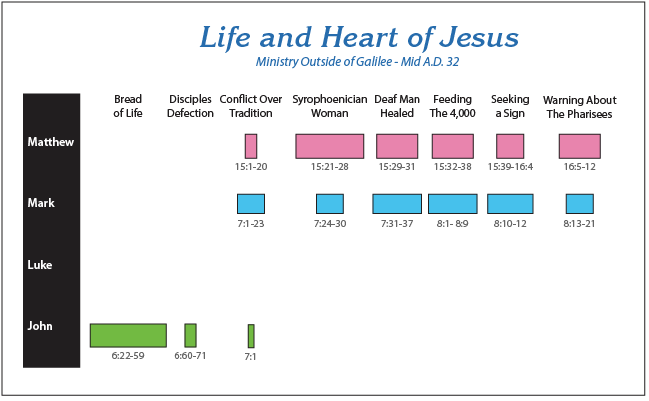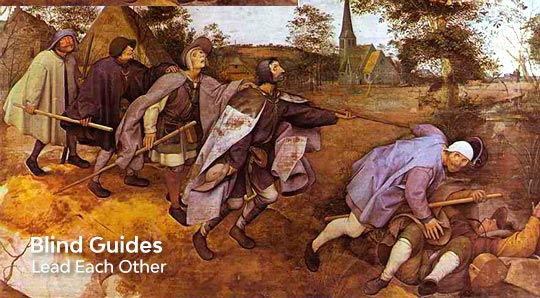Most organizations whether a church, business, club, or some other group have formal rules and a list of informal rules or expectations. Often the informal rules are more important than the formal ones. When conflicts occur, it is often over the unstated rules. The Jewish leaders of Jesus’ day had rules that God did not require. The Pharisees and Sadducees believed that God wrote the Torah, even though they ignored key parts. In addition to those writings, they created their own rules. A document called the Mishnah is a list of written rules that the Jews were supposed to follow. Jacob Neusner has published a new translation of the Mishnah. The book contains over 1,000 pages of rules. Almost every line on each page is a rule. It is an incredible number of rules that the Jewish leaders created. In addition, they had a list of oral rules. It must have been very difficult trying to follow the unwritten religious rules of Jesus’ day. This study explores the question, “How should we respond to the unwritten rules in our churches?”

Background
In our last study, Jesus attempted to help the crowd and the religious leaders understand that He had come down out of heaven, did the Father’s will, and was the Bread of Life – everything that they needed. Jesus explained that if anyone wanted to live forever, they had to come to Him, believe in Him, and include Him in their lives. As a result, many of Jesus’ so-called disciples struggled with His statements and deserted Him. The response of the religious leaders of Israel was worse. They wanted to kill Him. It was difficult for some to think of Jesus as a spiritual savior, and the religious leaders viewed him as competition. So Jesus was careful about where He walked. He remained in the north country – in Galilee.
After these things Jesus was walking in Galilee, for He was unwilling to walk in Judea because the Jews were seeking to kill Him. John 7:1 (NASB)
Religious Leaders From Jerusalem
The religious leaders were greatly disturbed over Jesus. Even though they could not kill Him while He remained in Galilee, they tried to discredit Jesus before the people. So Mark 7:1 tells us that some Pharisees and scribes came up from Jerusalem to investigate Jesus.
The Pharisees and some of the scribes gathered around Him when they had come from Jerusalem, and had seen that some of His disciples were eating their bread with impure hands, that is, unwashed. Mark 7:1-2 (NASB)
Once the Pharisees and scribes arrived, they soon found fault with some action of Jesus’ disciples. We should not be surprised. That was their goal. When they arrived, they surrounded Jesus, and asked Him what they thought was a difficult question. They were disturbed that Jesus’ disciples had been eating bread without ceremonially washing their hands. The gospel of Mark adds this explanation about ceremonial washing,
For the Pharisees and all the Jews do not eat unless they carefully wash their hands, thus observing the traditions of the elders; and when they come from the market place, they do not eat unless they cleanse themselves; and there are many other things which they have received in order to observe, such as the washing of cups and pitchers and copper pots. Mark 7:3-4 (NASB)
The process of “carefully washing their hands” involved washing the hands before and after eating. The process required a person to take at least half an “egg-shell” of clear water and pour on both hands. The hands had to be free of gravel, dirt, mortar or any other contaminant. The hands had to lifted up so that the water would run down to the wrist in order to ensure that the whole hand was washed and the “dirty” water did not re-flow across the fingers. Then the hands were rubbed against one another. If the water did not flow down to the wrist, the Jewish rabbis said that the hands were not clean and the process had to be repeated. If the hands had gravel, dirt, mortar or other contaminants when the washing started, the process was repeated twice. However, the second time, the water had to flow from the wrist down over the fingers. There were other variations to the washing ritual, but we will not discuss them here.[1]
The rabbis adopted this ritual in response to the washing that God required Aaron and the priests to perform (Exodus 30:19;40:12). They assumed that if it was good for the priest to do it, then it would be great for everyone to do it and to do it every day. The Jews tried to improve upon God’s laws. They even taught that the scriptures defiled the hands. Consequently, the hands needed to be washed after touching the scriptures. They burdened the people with their man made rules. Rules that God did not require. The religious leaders were trapped in their own system, having adopted a dishonoring system of supposedly religious righteousness.
The Elders’ Tradition
When Jesus’ disciples did not perform the ritualistic washing, the Pharisees and the scribes became unhappy with them. Even though the Pharisees knew that the ceremonial washing was not required by the Mosaic Law, they did not care. The rules were now their rules. They wanted them obeyed. Listen,
The Pharisees and the scribes asked Him, “Why do Your disciples not walk according to the tradition of the elders, but eat their bread with impure hands?” Mark 7:5 (NASB)
They said, “Why don’t you follow our rules – the elder’s traditions?” We can just hear them, “This is the way we have always done things! You are not a very good Jew, if you not follow our rules.” Jesus replied,
And He said to them, “Rightly did Isaiah prophesy of you hypocrites, as it is written: ‘THIS PEOPLE HONORS ME WITH THEIR LIPS, BUT THEIR HEART IS FAR AWAY FROM ME. BUT IN VAIN DO THEY WORSHIP ME, TEACHING AS DOCTRINES THE PRECEPTS OF MEN.’ Neglecting the commandment of God, you hold to the tradition of men.” Mark 7:6-8 (NASB)
Jesus quoted Isaiah 29:13. What sad words Jesus uses, “They honor Me with their lips., but their heart was far away . . .” They honored God with their lips – their words, but their worship was not real. What condemning words from our Lord! The religious leaders were full of religious activity, but God frowned on it. They were into ritual. The religious leaders did not care. They were too busy doing what they wanted.

How To Reject God’s Word
Then Jesus added,
You are experts at setting aside the commandment of God in order to keep your tradition . . . Mark 7:9 (NASB)
Wow! The Greek word translated as “setting aside” actually means “rejecting.” They were actively rejecting God’s word when they adopted their own rules. Some people hate “rules.” They refuse to submit to rules. They even avoid following the commands that God has given. It may not be very obvious, but the person who blatantly ignores the clear teaching of the scriptures is doing what he or she wants too! They are just like the Pharisees. Each is just as guilty as the other. Then Jesus quoted Exodus 20:12 and 21:15.
For Moses said, “HONOR YOUR FATHER AND YOUR MOTHER”; and, “HE WHO SPEAKS EVIL OF FATHER OR MOTHER, IS TO BE PUT TO DEATH” . . . Mark 7:10 (NASB)
That is a very serious law that few follow today. If it was followed, we would transform the world. If you think this is an isolated verse, look at these passages:
He who strikes his father or his mother shall surely be put to death. Exodus 21:15 (NASB)
You shall not uncover the nakedness of your father, that is, the nakedness of your mother. She is your mother; you are not to uncover her nakedness. Leviticus 18:7 (NASB)
Every one of you shall reverence his mother and his father, and you shall keep My sabbaths; I am the LORD your God. Leviticus 19:3 (NASB)
Cursed is he who dishonors his father or mother. Deuteronomy 27:16 (NASB)
You shall rise up before the grayheaded and honor the aged, and you shall revere your God; I am the LORD. Leviticus 19:32(NASB)
God’s message is very clear. We are to honor our parents – even those who are considered to be “old” or elderly. When we dishonor our parents, we dishonor ourselves. Or, we can honor them and honor God.
The religious leaders rejected God’s word when they adopted their own traditions. Listen to the rest of Jesus’ statement,
. . . but you say, “If a man says to his father or his mother, whatever I have that would help you is Corban (that is to say, given to God),” you no longer permit him to do anything for his father or his mother; thus invalidating the word of God by your tradition which you have handed down; and you do many things such as that.” Mark 7:11-13 (NASB)
The Greek for “Corban” refers to any item that the Jews supposedly “dedicated” to God. It then could not be given away or be used by another person. But the person who dedicated the item could still use it. It was a clever rule. You could keep the item and refuse to give it to someone who needed it. One cannot find the rule of “Corban” anywhere in the scriptures. It does not exist. So Jesus revealed that these supposedly religious leaders ignored God’s commands and did not honor their parents. They did not help their parents unless it was convenient or something that wanted to do. Their additional rules always favored the religious leaders. They were self-centered.

A Parable
Then Jesus turned from the Pharisees and the scribes and spoke to the crowd.
After Jesus called the crowd to Him, He said to them, “Hear and understand. It is not what enters into the mouth that defiles the man, but what proceeds out of the mouth, this defiles the man.” Matthew 15:10-11 (NASB)
Jesus uses the illustration of ceremonial washing to communicate spiritual truth. What defiles a person is not eating dirty food, but what comes from our lips – out of our mouths. How did the Pharisees and scribes react to this statement? The next verse reveals that they were offended. They had heart problems. They were cold as icebergs.
Then the disciples came and said to Him, “Do You know that the Pharisees were offended when they heard this statement?” Matthew 15:12 (NASB)
Jesus told the truth. His comment minimized the importance of their traditions. So they were offended. Isn’t it amazing how easily some people are offended even when they hear the truth? Some people are offended because they do not care about the truth or what pleases God. Recently, I spoke with a man who demanded to have things his way. It did not matter how unreasonable his request, he would not listen. He did not care. He wanted what he wanted. The religious leaders simply wanted what they wanted. Jesus’ next comment must have made them even more unhappy,
But He answered and said, “Every plant which My heavenly Father did not plant shall be uprooted. Let them alone; they are blind guides of the blind. And if a blind man guides a blind man, both will fall into a pit.” Matthew 15:13-14 (NASB)
Jesus’ message was that these men would never go to heaven. They had rejected God and they were rejecting Jesus. God the Father had not chosen them to be saved, and they had not chosen God either. They were spiritually blind men who were attempting to lead other spiritually blind people. What a sorry situation. Their followers thought that they were great, holy, and godly examples. They did not realize that their religious leaders were walking in spiritual darkness – blind guides. That is true today too! We have spiritually blind leaders among us who strongly believe that they knew the truth. Some strongly argue their point of view. So did the Pharisees. It is possible to be a religious leader, to be a student of the scriptures just like the Pharisees and yet be spiritually blind. Are you
Meaning Of The Parable
Then Peter asked Jesus to explain the meaning of the parable. He replied.
Peter said to Him, “Explain the parable to us.” Jesus said, “Are you still lacking in understanding also? Do you not understand that everything that goes into the mouth passes into the stomach, and is eliminated? But the things that proceed out of the mouth come from the heart, and those defile the man. For out of the heart come evil thoughts, murders, adulteries, fornications, thefts, false witness, slanders. These are the things which defile the man; but to eat with unwashed hands does not defile the man.” Matthew 15:15-20 (NASB)
Your mouth reveals who you are. You are what you say. If the words that come from your mouth are hateful, angry, and unloving, then others will know something about your heart. If we listen to our politicians, newscasters, teachers, plumbers, housewives, husbands, children, and other people carefully, we will know something about their hearts. But God does not need to listen, He can see your heart. He knows who you really are.
The Holy Spirit wrote this about the hearts of the righteous and the wicked.
The tongue of the righteous is as choice silver,
The heart of the wicked is worth little. Proverbs 10:20 (NASB)The heart of the righteous ponders how to answer,
But the mouth of the wicked pours out evil things. Proverbs 15:28 (NASB)
Are you stunned by the statement, “The heart of the wicked is worth little.” Did you notice that the mouth of the wicked is constantly pouring out evil? Do you know someone who has a mouth problem – uh, a heart problem?
None of us have perfect lips (James 3:2). We all err with our lips. Actually, we are all wicked in the truest sense, but the proverb is talking about someone who has a serious problem. A follower of Jesus may occasionally err with his or her mouth, but there should not be a pattern of evil. If you constantly struggle with your mouth and you claim to be a Christian, then you need to talk with God. You may not be a follower of God after all. If you are a follower, then you need to confess the sins of your mouth (1 John 1:9) and ask the Holy Spirit to fill you each day and give you a mouth that is seasoned with grace (Colossians 4:6).
Conclusion
“Is Jesus pleased with your conduct? Are you following traditions or man made rules, thinking that God is pleased?” Maybe you are not following any rules and think that God is pleased. Consider the following story.
On his sixteenth birthday the son approached his father and said, “Dad, I’m sixteen now. When can I get my license, can I drive the family car?” His dad looked at him and said, “Son, driving the car takes maturity, and first, you must prove you are responsible enough. And one way you must do that is to bring up your grades. They are not acceptable. Second, you must read the Bible every day. And finally, 1 want you to get that hair cut; it looks outrageous.” The son began the task of fulfilling his father’s requirements, knowing that the last might be impossible. When his grades came out he came to his dad with a big smile. “Look, Dad, all A’s and B’s on my report card. Now can I drive the family car?” “Very good, son. You are one-third of the way there, but have you been reading the Bible?” the father replied. “Yes, Dad, every day,” said the son. “Very good, Son. You are two-thirds of the way there. Now when are you going to get that hair cut?” The son, thinking he could outsmart his dad, responded, “Well, I don’t see why I should get my hair cut to drive the car. Jesus had long hair, didn’t He?” The father looked at his boy and said, “That’s right, son, and Jesus walked everywhere he went.’
One thing was missing. The son lacked the desire to be conformed to God’s Word. We should not add to it or ignore it. How about you? Are you trapped in your traditions, your own rules, or your own expectations as to how others should behave? If so, you will be just like the Pharisees who were easily offended by Jesus and unhappy. They were wrong and Jesus was right. Or, maybe you are avoiding some things that God wants you to do. The Pharisees did that too! Are you avoiding going to church or witnessing? If so, read Hebrew 10:24-25 and Matthew 28:19-20, and then consider, did God not know about the special situation you would be involved in in the future?
The greatest joy in life is pleasing God. Then He gives us His peace and joy. It comes when we are committed to doing His will. Jesus said,
If you keep My commandments, you will abide in My love; just as I have kept My Father’s commandments and abide in His love. John 15:10 (NASB)
God wants our heart – a passion for Him and a passion to please Him in our conduct. There is no greater joy than pursuing His holiness!
References:
1. Alfred Edersheim. The Life And Ties of Jesus The Messiah. Eerdmans Publishing Co., Grand Rapids, Michigan. 1973. Book 3, p. 11-12.